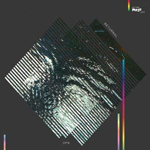|
|
 |
Dusted Reviews
Artist: Oneohtrix Point Never Album: Returnal Label: Editions Mego Review date: Jun. 22, 2010 |

|
|
|
 |
There’s something almost proper, or at least something that inspires a feeling of completeness, about an album whose theme is in harmony with its aesthetic. Returnal, the fourth album from musician Daniel Lopatin’s project Oneohtrix Point Never, reminds me of Georges Perec’s novel A Void in this aspect. Perec’s novel is a 300-page lipogram in E -- that is, written entirely without the use of that letter, and whose central plot directly reflects and is embroiled in this absence. The theme and aesthetic merge. For Returnal, this convergence takes place by having the theme of the eternal recurrence directly emerge from and comment on the form of the music itself.
Lopatin is skilled at creating music that is both disorienting and pleasing at once. Whether noise, drone, ambient or minimalist, the form of the music continually shifts, which fulfills the role in traditional minimalism that’s reserved for the addition of new patterns to the mix; to shift the focus and change the entire piece by creating new relations between the patterns. On Returnal, more so than Lopitan’s other albums, this shifting of styles serves to accomplish this without ever feeling disjointed or jarring; the album itself plays as a seamless whole. The disorientation instead comes from the slight, almost imperceptible off-kilter feeling to the music. It’s always buried in a pleasing array of tones, creating a very peculiar and unique feel. Almost like a welcoming vertigo.
The eternal return is, at its base, a dialectical concept. When history transforms into the next stage, nothing ever goes away, it just transforms. History repeats itself as a transformation of past stages, and the past bubbles up in unexpected and surprising ways; or, the same past gains new meaning by showing up in new surroundings. Think of the individualism of early America, the can-do pioneer spirit now showing up as a sclerotic, rotten sentiment in the oil-black heart of the U.S. The eternal return is the beating of the Dionysian universe that underlies everything – an order that returns to chaos, and that later reforms.
Returnal deals with these themes overtly – song titles like the title track and “Ouroboros” as well as the cleverly titled “Where Does Time Go,” which, of course, is meant in both the everyday sense and a more thematic one, ala where does it lead to? If time eternally returns, where does this actually go to or end up at? As Nietzsche asks in The Gay Science, is the smart reaction to this circularity dread and grief, or is it joy? In practice, Returnal deals with this by looping in on itself. While the first and last tracks are quite different, there is a consonance between them. And on the album as a whole, parts appear and reappear later, again transformed by their repetition in new surroundings. The meaning, then, is in the whole -- and in the whole of these transformations.
By Andrew Beckerman
|







